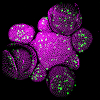
Professor Elliot Meyerowitz has been awarded the 2018 Gruber Genetics Prize by the Gruber Foundation for his "groundbreaking work in identifying the basic regulatory and biochemical mechanisms underlying the development of plants."
He shares the $500,000 award with Professor Joanne Chory, Director of the Plant Molecular and Cellular Biology Laboratory at the Salk Institute for Biological Studies.
These two renowned scientists received the 2018 Gruber Genetics Prize for their groundbreaking work in identifying the basic regulatory and biochemical mechanisms underlying the development of plants. Their discoveries revolutionised the field of plant molecular biology, with broad implications for global agriculture, the environment, and human health and disease.
The Yale-based Gruber International Prize Program annually honours individuals whose research inspires and enables fundamental shifts in knowledge and culture.
Professor Meyerowitz is the inaugural Director of Sainsbury Laboratory Cambridge University (SLCU) (2011-2012). He retains a close connection with SLCU as a Distinguished Associate and continues to pursue his research at the California Institute of Technology (Caltech), where he is the George W. Beadle Professor of Biology and an investigator of the Howard Hughes Medical Institute.
Professor Meyerowitz pioneered the use of Arabidopsis thaliana to study plant development and he elucidated the regulatory mechanisms underlying flower shapes and patterns.
In a series of groundbreaking experiments published in the mid-1980s he demonstrated that the genome of A. thaliana is smaller than nearly all other plant species and that it contains very little repetitive DNA — two characteristics that made it an extremely useful research model. Professor Meyerowitz then created a molecular linkage map for Arabidopsis — the first one devised for a plant — and made it available to anyone who wanted to use it. Broad recognition for Arabidopsis came, however, a few years later, when Elliot’s lab developed the ABC model of flower organ development.
Based on observations of Arabidopsis mutants with altered flower development, this model describes how the expression of three classes of genes (A, B, and C) cause flowers to form, not only in the tiny mustard plant, but in all flowering plants. The finding has had major implications for human health and nutrition, for controlling the timing and form of flowers makes it possible to increase the yield of seeds — and food crops.
Meyerowitz went on to help isolate the receptor for ethylene, a critical hormone that regulates many aspects of growth and development in plants, including the ripening of fruit. His lab then showed that this receptor was encoded by a family of proteins that had been previously known to control cellular responses in bacteria, but not in higher organisms. Other major contributions to plant molecular genetics from Meyerowitz’s lab include the development of a model for how a plant’s shoot apical meristem (its above-ground growing tip) guides the lateral positioning of flowers.
Read the full award citation at the Gruber Foundation website.





